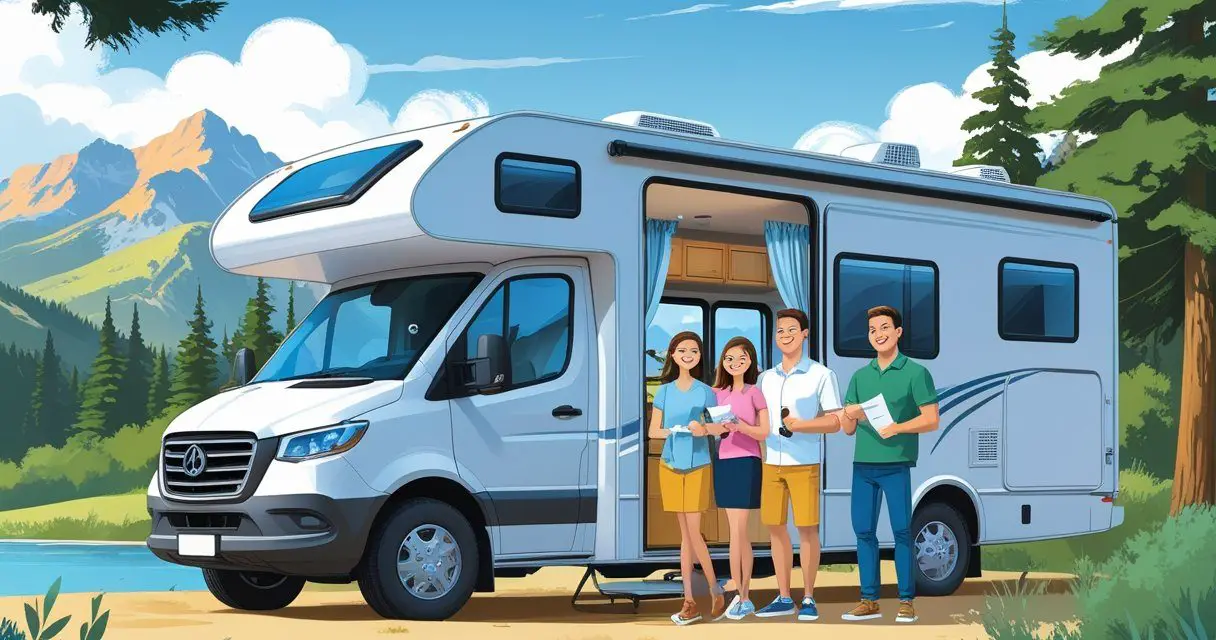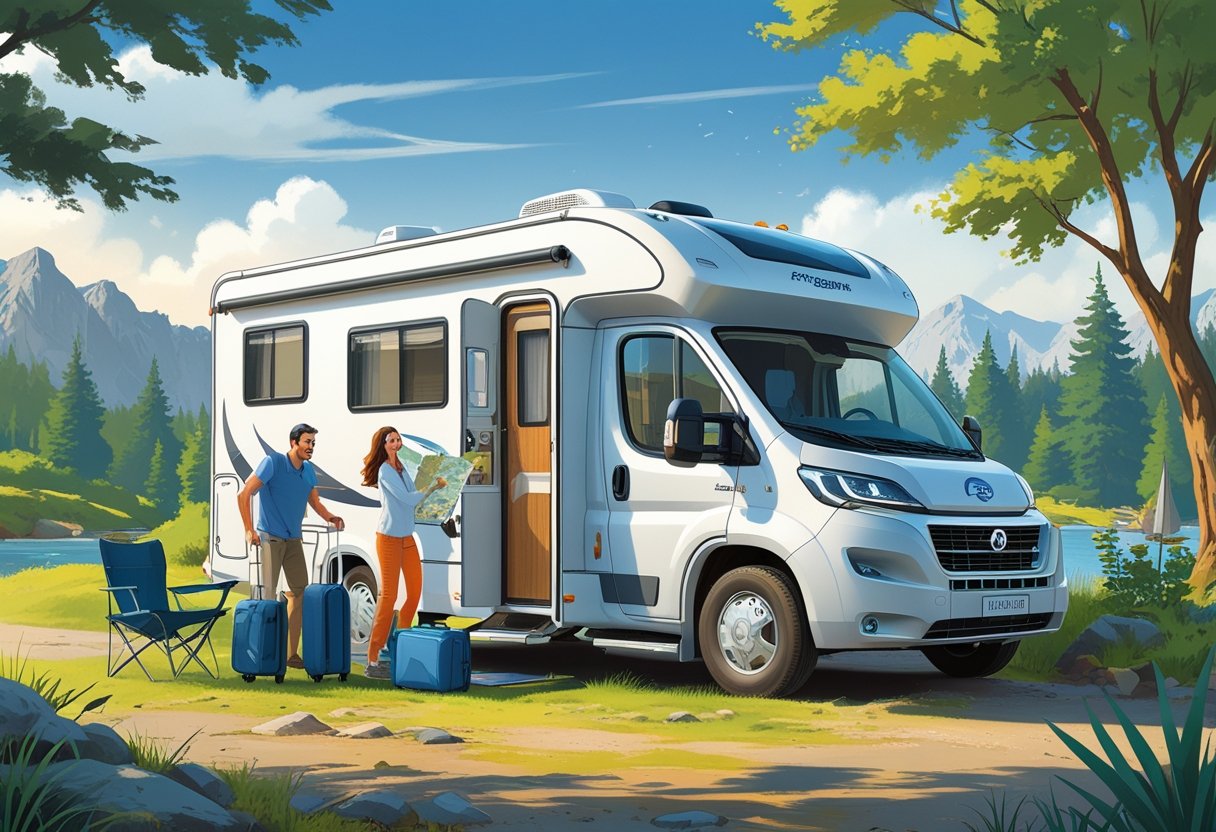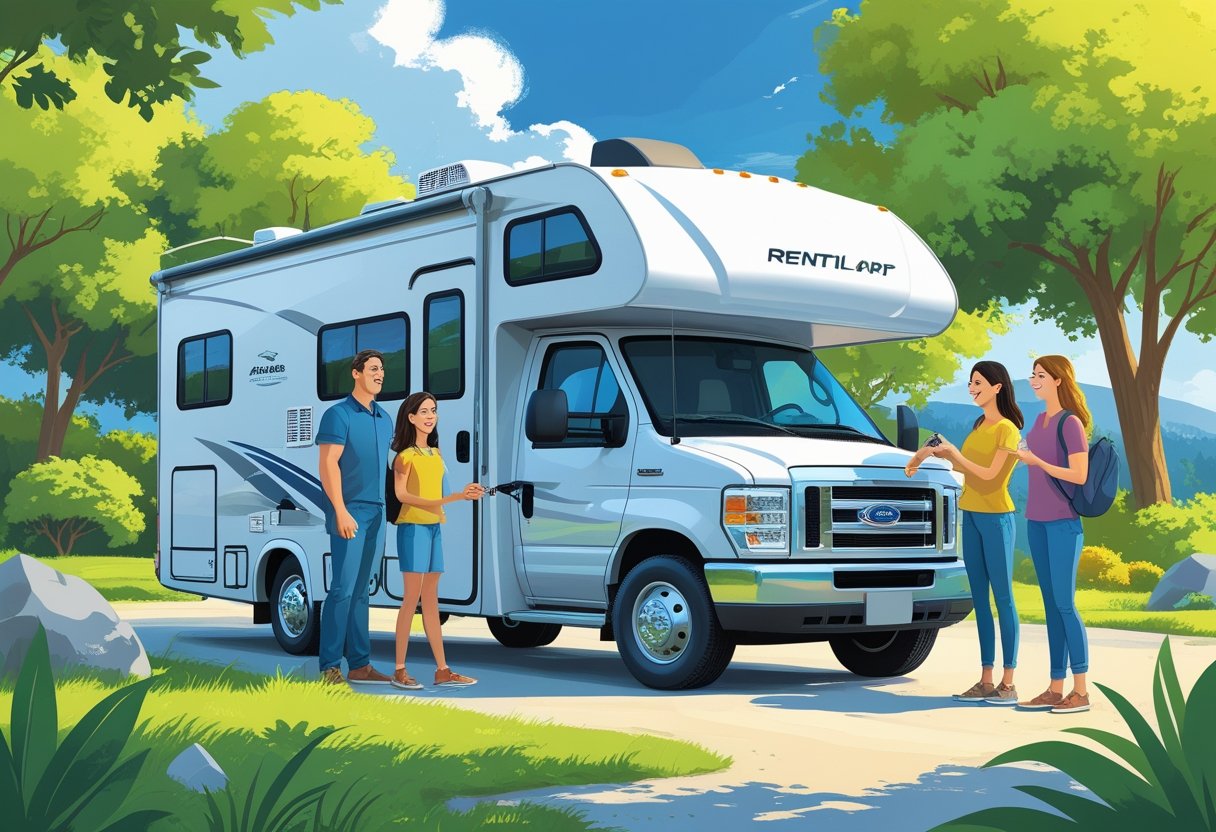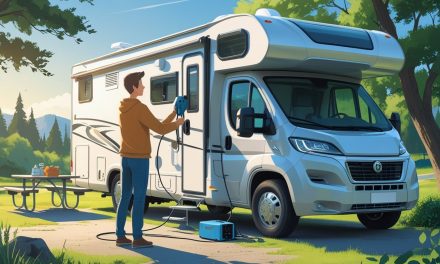This comprehensive guide will walk you through everything you need to know about transforming your recreational vehicle into a profitable rental business. From choosing the right platform to setting competitive rates, preparing your RV, and navigating insurance requirements, we’ll cover all the essentials to help you maximize your rental income while protecting your investment.
The Growing Market of RV Rentals
The RV rental market has experienced unprecedented growth in recent years. The pandemic accelerated this trend as travelers sought safe, self-contained vacation options that allowed for social distancing while enjoying the great outdoors. This shift in travel preferences has created a golden opportunity for RV owners.
According to industry reports, the peer-to-peer RV rental market has grown by over 650% since 2013. With the average RV rental ranging from $100 to $450 per night depending on the type and age of the vehicle, owners can generate significant income, especially during peak travel seasons and holidays.
“The average yearly income for someone renting out one RV is $40,000-$60,000! That’s enough to cover your RV payments, maintenance costs, and still put extra money in your pocket.”
This growing demand presents a unique opportunity for RV owners to offset their ownership costs and potentially turn their recreational investment into a profitable business venture. Let’s explore how you can tap into this market effectively.
Choosing the Right RV Rental Platform
Selecting the right platform to list your RV is crucial for your rental success. Each platform offers different features, fee structures, and user bases. Here’s a comparison of the most popular options:
| Platform | Commission Fee | Insurance Coverage | User Base | Special Features |
| Outdoorsy | 20-25% | $1M liability + comprehensive | Largest in the industry | 24/7 roadside assistance, DMV checks |
| RVshare | 15-25% | Up to $1M liability | Large, established | Secure payment, 24/7 emergency support |
| RVezy | 15-20% | $2M liability (in Canada) | Growing, strong in Canada | Low damage claim rate (under 1%) |
| Cruise America (Consignment) | Variable | Commercial policy | Traditional rental customers | They handle everything, less control |
Platform Pros and Cons
Outdoorsy Pros
- Largest user base means more potential renters
- Comprehensive $1M insurance policy
- 24/7 roadside assistance included
- Thorough DMV checks on all drivers
- User-friendly owner dashboard
Outdoorsy Cons
- Higher commission fees (up to 25%)
- More competition due to popularity
- May require more hands-on management
- Payment processing takes 24 hours after pickup
RVshare Pros
- Established platform with good reputation
- Slightly lower fees on some rentals
- One-on-one customer support
- Secure and instant payment system
- Simple listing process
RVshare Cons
- Smaller user base than Outdoorsy
- Less comprehensive verification process
- Insurance coverage may vary by state
- Less customization for listings
Preparing Your RV for Rental Success
Before listing your RV, you need to ensure it’s rental-ready. This preparation phase is crucial for attracting quality renters, commanding premium rates, and avoiding potential issues down the road.
Essential Preparation Checklist
Maintenance and Safety
- Complete a comprehensive mechanical inspection
- Check and service all appliances and systems
- Update all safety equipment (fire extinguisher, smoke/CO detectors)
- Verify tire condition and age (replace if older than 5-7 years)
- Test all electrical systems and generators
- Service the engine and check fluid levels
Cleaning and Presentation
- Deep clean interior (including upholstery and mattresses)
- Sanitize bathroom and kitchen areas
- Wash and wax exterior
- Remove personal items and create storage for renters
- Consider professional detailing for first-time rentals
- Create an inventory of included items
Insurance and Legal Requirements
Proper insurance coverage is non-negotiable when renting out your RV. While platforms like Outdoorsy and RVshare offer insurance during rentals, you should understand exactly what’s covered and what’s not.
Important: Standard RV insurance policies typically DO NOT cover commercial use. Inform your insurance provider about your rental plans to ensure you’re properly covered when your RV is not being rented through a platform.
Insurance Considerations
- Verify platform insurance coverage limits and exclusions
- Consider supplemental commercial insurance
- Understand deductible amounts and responsibility
- Check if personal items inside the RV are covered
- Review roadside assistance options
Legal Documentation
- Create a comprehensive rental agreement
- Develop clear rules and expectations document
- Prepare damage deposit terms and inspection procedures
- Check local regulations regarding RV rentals
- Consider forming an LLC for liability protection
Developing a Profitable Pricing Strategy
Setting the right price for your RV rental is crucial for maximizing your income while remaining competitive. Your pricing strategy should be flexible, accounting for seasonality, local events, and market demand.
Factors That Influence Your Rental Rate
RV Specifications
- RV class and size (Class A, B, C, travel trailer, etc.)
- Age and condition of your vehicle
- Luxury features and amenities
- Sleeping capacity
- Fuel efficiency
Market Factors
- Local demand and competition
- Proximity to popular destinations
- Seasonal variations
- Local events and festivals
- Weekend vs. weekday rentals
Rental Terms
- Minimum rental duration
- Mileage allowance and overage fees
- Generator usage fees
- Cleaning and preparation costs
- Delivery options and fees
Recommended Pricing Structure
| RV Type | Base Rate (Off-Season) | Standard Rate | Peak Season Rate | Holiday Premium |
| Class A Motorhome (Luxury) | $250-300/night | $350-400/night | $400-500/night | +$50-100/night |
| Class A Motorhome (Standard) | $200-250/night | $275-350/night | $350-400/night | +$50-75/night |
| Class C Motorhome | $150-200/night | $200-275/night | $275-350/night | +$50/night |
| Class B Campervan | $100-150/night | $150-200/night | $200-250/night | +$25-50/night |
| Travel Trailer (Large) | $100-150/night | $150-200/night | $200-250/night | +$25-50/night |
| Travel Trailer (Small) | $75-100/night | $100-150/night | $150-200/night | +$25/night |
Additional Fee Considerations
Standard Additional Fees
- Cleaning fee: $50-150 depending on RV size
- Mileage: Include 100-150 miles/day, charge $0.25-0.75/mile over
- Generator use: Include 3-4 hours/day, charge $3-5/hour over
- Pet fee: $50-100 per rental (if you allow pets)
- Delivery/setup fee: $50-200 based on distance
Optional Add-ons (Extra Revenue)
- Fully stocked kitchen package: $50-75
- Bedding/linens package: $40-60
- Outdoor furniture set: $25-50
- BBQ grill: $25-40
- Bike rack: $20-30
- National park pass: $20-30
Pro Tip: Offer discounts for longer rentals to encourage extended bookings. A common approach is 10% off for 7+ days and 15-20% off for 14+ days. This reduces your turnover work while maintaining steady income.
Creating an Irresistible RV Listing
Your listing is your rental’s storefront. A well-crafted listing with professional photos and detailed descriptions can significantly increase your booking rate and allow you to command higher prices.
Photography Tips for Higher Bookings
Essential Shots to Include
- Exterior (all sides, including awning area)
- Driver’s area and dashboard
- Living area and seating
- Kitchen and appliances
- Bathroom facilities
- Sleeping areas (all beds made up)
- Storage spaces (open and organized)
- Special features and amenities
Photography Best Practices
- Shoot during “golden hour” for exterior shots
- Use natural light when possible for interiors
- Clean and stage each area before shooting
- Use wide-angle lens but avoid distortion
- Include lifestyle shots showing the RV in use
- Consider professional photography for best results
- Edit for brightness and color correction only
Writing a Compelling Listing Description
Essential Information to Include
- RV make, model, year, and class
- Sleeping capacity and bed configurations
- Key features and amenities
- Driving requirements and dimensions
- Rental rules and expectations
- Included items and optional add-ons
- Pickup/delivery options and location
Description Writing Tips
- Start with a compelling headline
- Highlight unique selling points
- Use descriptive, sensory language
- Address common concerns proactively
- Include nearby attractions and destinations
- Be honest about limitations or quirks
- End with a call-to-action
“The quality of your listing directly impacts your booking rate and the type of renters you attract. Investing time in creating a professional, detailed listing will pay dividends through higher rates and better renters.”
Managing Renters Effectively
Successful RV rentals require more than just a great vehicle and listing—they demand excellent renter management. How you communicate with and support your renters can make the difference between a one-time rental and repeat business with glowing reviews.
Pre-Rental Communication
Initial Inquiry Response
- Respond promptly (within 1-2 hours if possible)
- Answer all questions thoroughly
- Provide additional helpful information
- Be friendly but professional
- Set clear expectations about the rental process
- Ask about their trip plans to provide tailored advice
Pre-Rental Preparation
- Send detailed pickup instructions
- Provide a pre-trip checklist for renters
- Share digital RV manual or operation guide
- Confirm arrival time and location
- Remind about required documentation
- Set expectations about the orientation process
Orientation and Handover Process
A thorough orientation is crucial for a successful rental experience. Plan for 60-90 minutes to properly introduce renters to your RV’s systems and features.
Exterior Orientation
- Demonstrate hookups (water, electric, sewer)
- Show propane tank location and operation
- Explain awning operation and care
- Point out exterior storage compartments
- Demonstrate slide-out operation
- Review exterior lights and features
Interior Systems
- Explain water system and tank monitoring
- Demonstrate bathroom operation
- Show how to use appliances
- Review climate control systems
- Explain power management
- Demonstrate entertainment systems
Driving & Safety
- Review driving tips and height awareness
- Explain turning radius and backing up
- Point out blind spots and mirrors
- Demonstrate emergency equipment
- Review roadside assistance process
- Explain what to do in case of breakdown
During and Post-Rental Support
During the Rental
- Be available for questions via phone/text
- Provide troubleshooting assistance remotely
- Respond promptly to any issues
- Have a plan for emergency situations
- Check in once during longer rentals
Return Process
- Schedule enough time for thorough inspection
- Use a checklist to verify condition
- Document any damages immediately
- Process security deposit return promptly
- Ask for feedback and a review
- Invite them to book again with a discount
Important: Always document the condition of your RV before and after each rental with detailed photos. This documentation is invaluable if disputes arise about damages or security deposit returns.
Legal and Insurance Considerations
Protecting yourself legally and financially is essential when renting out your RV. Understanding the insurance coverage and legal requirements will help you avoid costly mistakes and ensure peace of mind.
Understanding Insurance Coverage
Platform Insurance
- Coverage typically active only during rental periods
- Usually includes liability and comprehensive coverage
- May have significant deductibles ($1,000-$1,500)
- Often excludes certain activities or locations
- May not cover personal belongings
- Typically includes roadside assistance
Personal RV Insurance
- Standard policies typically exclude commercial use
- Inform your insurance provider about rental plans
- Consider specialized RV rental insurance
- Look for policies that cover “gaps” in platform coverage
- Ensure coverage during non-rental periods
- Consider umbrella liability policies
Legal Protection Strategies
Business Structure
- Consider forming an LLC for liability protection
- Separate personal and business finances
- Consult with a tax professional about structure
- Obtain necessary business licenses
- Register with local tourism authorities if required
Rental Agreements
- Use comprehensive rental agreements
- Clearly outline responsibilities and limitations
- Include detailed damage policies
- Specify prohibited activities and locations
- Have renters sign liability waivers
- Consider having agreements reviewed by an attorney
Local Regulations
- Research local zoning laws regarding RV storage
- Check HOA restrictions if applicable
- Understand local tax requirements for rental income
- Verify if special permits are needed
- Stay informed about changing regulations
Strategies to Maximize Your RV Rental Income
Once you’ve established your RV rental business, you can implement several strategies to increase your bookings, command higher rates, and maximize your overall profitability.
Building a 5-Star Reputation
Earning Great Reviews
- Exceed expectations with cleanliness and preparation
- Provide detailed orientation and support
- Respond quickly to questions and concerns
- Include thoughtful touches (welcome basket, local info)
- Be flexible when reasonable
- Follow up after the rental to ensure satisfaction
Handling Issues Effectively
- Address problems promptly and professionally
- Offer fair solutions to legitimate complaints
- Document all communication about issues
- Learn from negative feedback and improve
- Respond professionally to all reviews
- Turn problems into opportunities to impress
Upselling and Add-on Services
Premium Packages
- Fully stocked kitchen package
- Luxury bedding and towels
- Outdoor camping setup (chairs, table, grill)
- Entertainment package (games, movies)
- Welcome basket with local treats
- National park pass and guidebooks
Convenience Services
- Delivery and setup at campgrounds
- Stocking the RV with groceries
- Airport pickup for out-of-town renters
- Flexible pickup/drop-off times
- Pet-friendly accommodations
- Itinerary planning assistance
Repeat Customer Incentives
- Loyalty discounts for return renters
- Referral bonuses for new customer recommendations
- Off-season special rates for previous customers
- Priority booking windows
- Free upgrades or add-ons for loyal customers
- Last-minute availability notifications
Optimizing Your Rental Calendar
Maximizing Booking Rates
- Implement dynamic seasonal pricing
- Offer weekday discounts to fill gaps
- Create special packages for events and holidays
- Consider minimum stay requirements during peak times
- Offer last-minute discounts for unfilled dates
- Block personal use dates well in advance
Efficient Turnover Management
- Develop a systematic cleaning checklist
- Consider hiring help for turnovers
- Schedule adequate time between rentals
- Keep spare sets of linens and supplies
- Create an inventory system for restocking
- Use same-day turnarounds only when necessary
Pro Tip: Many successful RV owners report that delivery and setup services can increase your booking rate by 30-40% while allowing you to charge premium rates. If you have the time and ability, offering delivery within a reasonable radius can significantly boost your income.
Understanding Tax Implications of RV Rentals
Renting out your RV creates tax obligations, but it also opens up valuable deduction opportunities. Understanding the tax implications will help you maximize your after-tax profits and avoid potential issues with tax authorities.
Rental Income Reporting
Income Classification
- Rental income must be reported on Schedule E
- Platforms may issue 1099-K forms for your earnings
- Report all income even if below 1099 threshold
- Keep detailed records of all rental transactions
- Track security deposits separately from income
- Understand active vs. passive income classification
Business Structure Considerations
- Sole proprietorship: Report on Schedule C
- LLC: May offer liability protection with pass-through taxation
- S-Corporation: Potential tax advantages for larger operations
- Consider consulting a tax professional about structure
- Separate business and personal finances
- Obtain EIN if operating as a business entity
Deductible Expenses
Direct Rental Expenses
- Platform commission fees
- Rental insurance premiums
- Cleaning and maintenance between rentals
- Supplies provided to renters
- Advertising and marketing costs
- Delivery and setup expenses
Prorated Expenses
- RV loan interest (based on rental percentage)
- Depreciation (modified accelerated cost recovery)
- Storage fees when not in personal use
- General maintenance and repairs
- Annual registration and licensing
- Insurance during non-rental periods
Business Operation Expenses
- Home office (if used for rental management)
- Business phone and internet
- Accounting and tax preparation fees
- Legal and professional services
- Business bank account fees
- Business insurance and licenses
Important: The tax information provided here is general guidance only. Tax laws change frequently and vary by location. Consult with a qualified tax professional familiar with rental property taxation to ensure compliance with current regulations and to optimize your tax strategy.
Real RV Owner Success Stories
Many RV owners have successfully turned their vehicles into profitable rental businesses. These real-world examples demonstrate what’s possible when you approach RV rentals strategically.
Mark’s Class A Motorhome
“I purchased my 2018 Class A motorhome for retirement travel, but it was sitting unused most of the year. After listing it on Outdoorsy, I made $42,000 in my first year with 18 bookings. The income covers my loan payment, insurance, and maintenance with profit left over. I still use it myself for 2-3 trips annually.”
Sarah’s Travel Trailer
“I started renting out my 2020 travel trailer as a side hustle. What makes my rental unique is that I offer delivery and setup at local campgrounds. This service allowed me to charge premium rates and attract renters who don’t have tow vehicles. Last year, I made $28,500 from 25 bookings, mostly during summer months.”
Carlos’s Class B Campervan
“I invested in a new Class B campervan specifically as a rental business. Its compact size and easy driving make it popular with couples and solo travelers. I focus on providing an exceptional experience with a fully stocked kitchen and outdoor gear. In my second year, I generated $36,000 from 32 bookings and have a 95% 5-star review rate.”
“The key to success isn’t just having a nice RV—it’s providing exceptional service, clear communication, and going the extra mile for your renters. Those who treat this as a hospitality business rather than just a vehicle rental consistently earn more and get better reviews.”
Common Pitfalls to Avoid
While renting out your RV can be profitable, there are several common mistakes that new owners make. Being aware of these pitfalls can help you avoid costly errors and frustration.
Insurance and Legal Issues
- Relying solely on platform insurance without understanding coverage gaps
- Not informing your personal insurance company about rental activity
- Using inadequate rental agreements that don’t protect your interests
- Failing to document pre-existing damage before rentals
- Not checking local regulations regarding RV rentals
Business Management Errors
- Setting prices too low or too high based on emotional factors
- Not accounting for all costs when calculating profitability
- Failing to set aside funds for maintenance and repairs
- Inadequate screening of potential renters
- Not keeping detailed records for tax purposes
- Overcommitting your calendar without personal buffer days
Customer Experience Mistakes
- Rushing through the orientation process
- Poor communication before, during, or after rentals
- Not providing clear written instructions for RV systems
- Inadequate cleaning between rentals
- Being inflexible with reasonable requests
- Failing to address minor issues before they become major problems
Warning: The biggest mistake new RV rental owners make is underestimating the time commitment required. Between cleaning, maintenance, communication, and orientations, each booking typically requires 4-6 hours of your time. Be realistic about whether you have the availability to manage rentals properly.
Start Your RV Rental Journey Today
Renting out your RV can be a rewarding way to offset ownership costs and generate significant income. With the right approach to pricing, presentation, renter management, and legal protection, you can build a successful rental business while still enjoying your RV for personal use.
Remember that success doesn’t happen overnight. Start with realistic expectations, learn from each rental experience, and continuously improve your processes. Many of the most successful RV owners began with a single vehicle and gradually refined their approach based on renter feedback and market demands.
Whether you’re looking to offset costs, generate side income, or build a full rental fleet, the RV sharing economy offers unprecedented opportunities for owners willing to provide quality vehicles and exceptional service.










